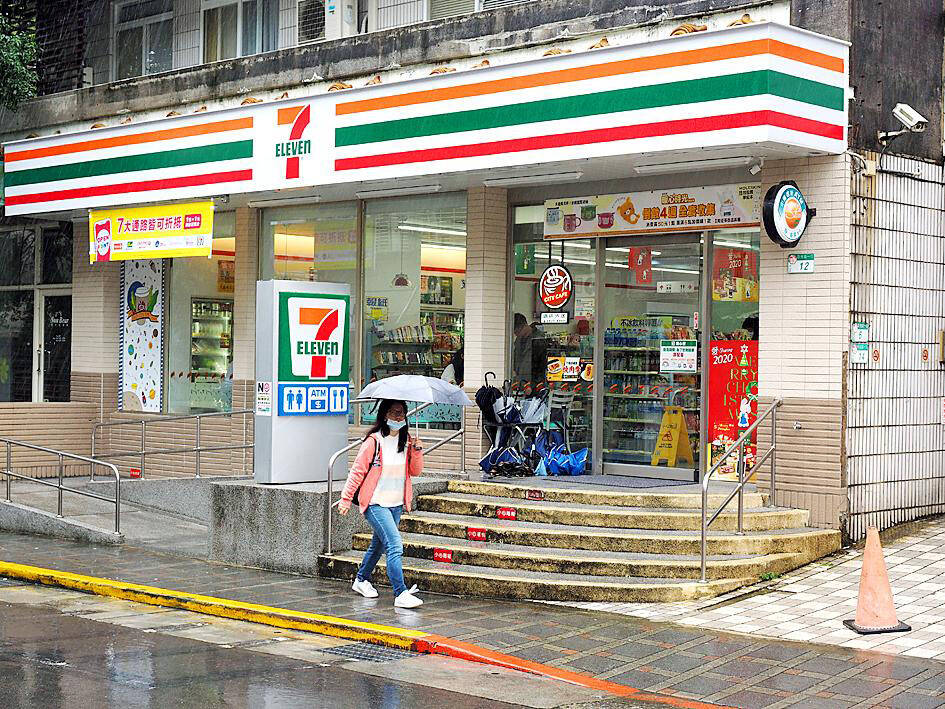The Presidential Office yesterday denied a foreign news report suggesting the government plans to use tens of thousands of convenience stores as “wartime hubs” in the event of a cross-strait war, saying it has no such specific plan.
The Guardian on Saturday reported that if domestic rail lines were shut down, airspace was closed to commercial traffic, and Internet and phone services were disrupted during a Chinese invasion, Taiwanese could seek help from local convenience stores.
“If all this happened, Taiwanese residents could walk to one of the island’s more than 13,000 convenience stores to pick up rations and medical supplies, delivered by the chains’ own logistical transport systems,” the report said, citing four unnamed sources familiar with discussions.

Photo: EPA-EFE
They could read government communications which have been faxed to the stores and displayed on the window. Or maybe they would be able to send a message using the store’s emergency hotspot,” it added.
The idea was being discussed by President William Lai’s (賴清德) Whole-of-Society Defense Resilience Committee, which aimed to make Taiwanese society more resilient in the event of an attack or natural disaster, the article said.
Responding to the report, Presidential Office spokesperson Karen Kuo (郭雅慧) yesterday said the idea of turning civilian distributors into emergency hubs had been brought up by retail industry representatives during meetings of the Whole-of-Society Defense Resilience Committee.
Representatives shared how they supported the public after the 921 Earthquake, Kuo said.
Although that was useful information for the government, the administration has not begun making the type of plans mentioned in The Guardian report, she said, adding that the government already has a plan for setting up wartime stations to distribute strategic materials.
The committee has pledged to enhance Taiwan’s resilience by training civilian forces, securing strategic and critical supplies, reinforcing energy and key infrastructure, and ensuring the continued operations of medical, transportation, information and financial facilities. It has so far held three rounds of meetings, most recently on March 27 during a civil defense drill in Tainan.
The Guardian also said that they expect “Taiwan’s military and maybe police will be sent to frontlines, leaving civilian first responders in charge of care and control.”
Kuo also denied that, saying that police would not be sent to the frontlines and emphasizing that they would be responsible for maintaining social order and logistics, and safeguarding key infrastructure during wartime.

Chinese spouse and influencer Guan Guan’s (關關) residency permit has been revoked for repeatedly posting pro-China videos that threaten national security, the National Immigration Agency confirmed today. Guan Guan has said many controversial statements in her videos posted to Douyin (抖音), including “the red flag will soon be painted all over Taiwan” and “Taiwan is an inseparable part of China,” and expressing hope for expedited reunification. The agency last year received multiple reports alleging that Guan Guan had advocated for armed reunification. After verifying the reports, the agency last month issued a notice requiring her to appear and explain her actions. Guan

The Kaohsiung Tourism Bureau audited six hotels in an effort to prevent price gouging ahead of Korean band BTS’ concert tour in the city scheduled for Nov. 19, 21 and 22 this year. The bureau on Friday said that the audits — conducted in response to allegations of unfair pricing posted on social media — found no wrongdoing. These establishments included the local branches of Chateau de Chine, Hotel Nikko, My Humble House, and Grand Hai Lai, it said, adding that the Consumer Protection Commission would have penalized price gougers had the accusations been substantiated. The bureau said the Tourism Development Act

BACK TO WINTER: A strong continental cold air mass would move south on Tuesday next week, bringing colder temperatures to northern and central Taiwan A tropical depression east of the Philippines could soon be upgraded to be the first tropical storm of this year, the Central Weather Administration (CWA) said yesterday, adding that the next cold air mass is forecast to arrive on Monday next week. CWA forecaster Cheng Jie-ren (鄭傑仁) said the first tropical depression of this year is over waters east of the Philippines, about 1,867km southeast of Oluanpi (鵝鑾鼻), and could strengthen into Tropical Storm Nokaen by early today. The system is moving slowly from northwest to north, and is expected to remain east of the Philippines with little chance of affecting Taiwan,

GIVE AND TAKE: Blood demand continues to rise each year, while fewer young donors are available due to the nation’s falling birthrate, a doctor said Blood donors can redeem points earned from donations to obtain limited edition Formosan black bear travel mugs, the Kaohsiung Blood Center said yesterday, as it announced a goal of stocking 20,000 units of blood prior to the Lunar New Year. The last month of the lunar year is National Blood Donation Month, when local centers seek to stockpile blood for use during the Lunar New Year holiday. The blood demand in southern Taiwan — including Tainan and Kaohsiung, as well as Chiayi, Pingtung, Penghu and Taitung counties — is about 2,000 units per day, the center said. The donation campaign aims to boost